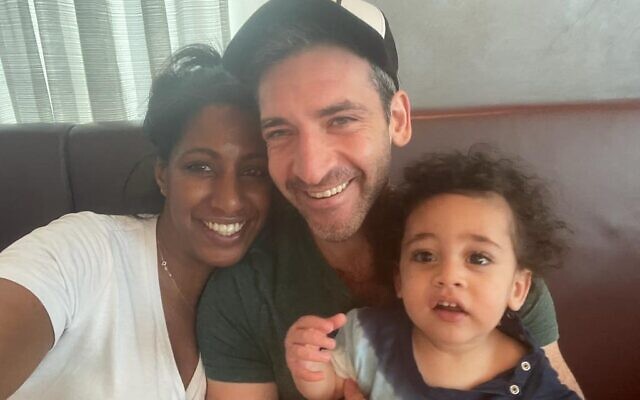YIR: Life In Israel Changed for Former Atlantans
Israelis are still dealing with national tragedy and trauma.
Days after the Oct. 7 surprise Hamas attack on Israel that included thousands of rockets launched against much of Israel, as well as an attack by its militants against outdoor concerts, communities, and army bases along the Gaza border, former Atlantans now living in Israel expressed resolve but uncertainty.
Former Congregation Or Hadash Rabbis Mario Karpuj and Analia Bortz reported from their home in Jerusalem that they were “safe, but we’re not okay.”
Former Atlantan Adam Frank, also a rabbi, told the AJT, “Life here is changed forever.”
Atlanta native Zach Rosenzweig, who lives with his wife, Yoella, and son, Ariel, in Kfar Saba in the center of the country, told the AJT that it was a “painfully dark and horrific time to be an Israeli and Jew. When you see Israelis being killed, entire families erased and know it could have been you. I think of my wife and son.”
But Rosenzweig, son of Michael Rosenzweig and Shelli Bank, said there’s “incredible resolve nationally. We have no choice but to fight this, despite the grievous divisions and mistakes that led to this attack.”
More than two months since the war began, Rosenzweig acknowledged that both his family and the country as a whole are still in a kind of shock.
“Frankly, our reality isn’t easy,” the former student at The Epstein School and Weber admitted. “I think most Israelis are having similar experiences, regardless of where they live or their personal connections to daily events. It still feels like we’re wading through a fog, and it’s difficult to separate our individual lives from the national tragedy and trauma.”
He said that “there’s nothing particularly remarkable about day-to-day events here in Kfar Saba. We’ve been lucky to experience very few sirens since the war began. We don’t know anyone fighting in Gaza, and we don’t spend much time worried for our safety. But Israel’s collective experience carries an emotional intensity that weighs on every person, and it colors every moment of our personal lives.”
Not surprisingly, Rosenzweig said, “the most significant events in recent weeks have been the hostage releases and the deaths of soldiers. We feel deeply affected by these developments, and they’ve filled our lives with a mix of complex emotions. All of us waited anxiously as the hostages were freed, not knowing whether they might be prevented from leaving Gaza, and it’s excruciating to know that 135 abducted Israelis, including women and children, are still being held in Hamas captivity. The daily deaths of soldiers are painful and heart-wrenching, and they remind us of the sacrifices we’ll continue to endure until the war ends.”
When Rosenzweig served in the Israel Defense Forces, he was in the spokesperson unit. While there, he helped monitor social media. He is now the Israel-based representative for the U.S. organization Israel on Campus Coalition, doing the same kind of work, at the same time finishing up a PhD at Hebrew University.
“I’m continuing my work with ICC, which I still find very meaningful,” he reported. “This is a type of service. It requires monitoring what’s happening closely. There’s a lot of work involved in exposing U.S. audiences to what is happening.”
As a family, Rosenzweig said, “We try to contribute what we can. Yoella works as a teacher and volunteers occasionally in Kfar Saba. Ariel is cute and cheerful as can be, and luckily, he seems oblivious to the situation as an 18-month-old baby.”
Rosenzweig reflected the desire to help his fellow Israelis, as did other former Atlantans. Bortz and Karpuj reported lining up to give blood and accumulating all kinds of supplies to bring to survivors of the attacks along Gaza who were transported to hotels along the Dead Sea and in the south to Eilat, as well as supplies for the 300,000 reserve soldiers called up for duty. There were so many cars delivering the supplies to the hotels that the parking lots quickly filled, said Bortz. “People are taking destiny in their own arms,” she said.
They symbolize the incredible surge in volunteerism as noted in a recent Hebrew University survey. That survey showed that nearly half of all Israelis had performed some kind of volunteer work since the war began.
“A noteworthy proportion of volunteers (25 percent) are identified as ‘spontaneous volunteers,’ previously unengaged individuals who have stepped up during the conflict. This surge in participation marks a departure from routine volunteering trends, with only 20 percent having a history of regular volunteering,” according to Hebrew University, which released the survey results to mark International Volunteer Day which was held on Dec. 5.




comments